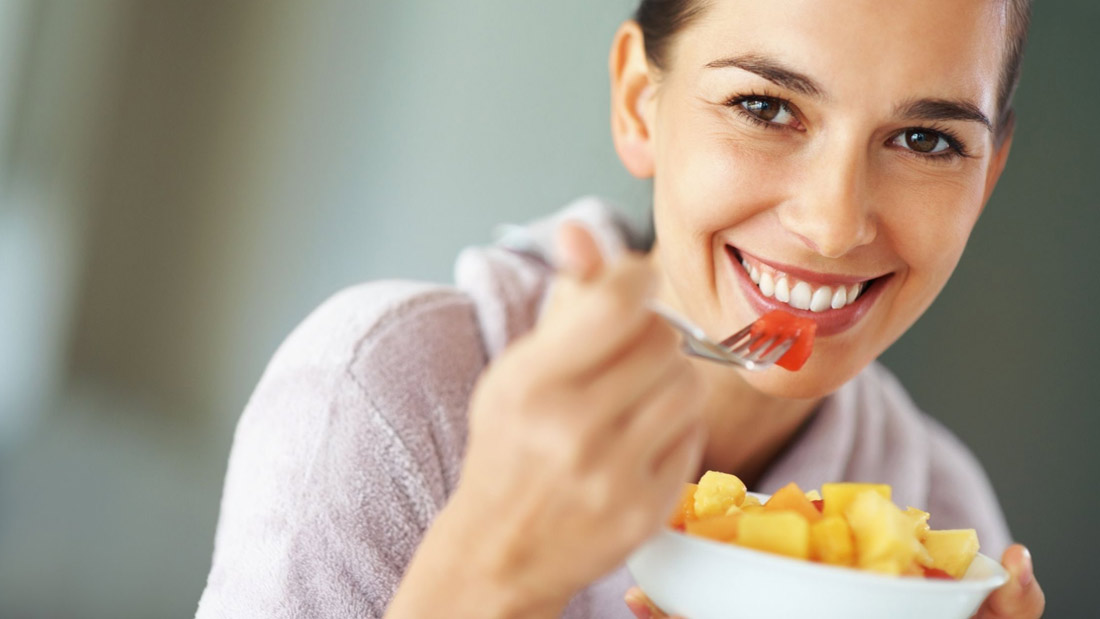Acne and diet – what to eat for healthier skin

Our skin shows what’s going on inside us a little too well – it tells on us when we overindulge, drink too much, sleep too little, have a stressful week or experience hormonal upheavals. While most of these things happen only once in a while (hopefully), what you eat affects your skin on a daily basis and there’s a lot you can do to nourish it and banish acne – for good.
Drop dairy
Hormones in cow’s milk and dairy products stimulate acne and can make it worse. Studies show that when bodybuilders switch from whey protein powder to non-dairy products, their acne disappears. Similarly, teenagers who consume a lot of dairy products have more acne than those who don’t. Going dairy-free can be the greatest step towards a healthy skin.
Choose your sugars
You may have noticed that when you’ve eaten a lot of cake, biscuits and chocolate, you pay for it the next day with pimples popping up left, right and centre. Eating too much sugar makes your body produce more of the hormone insulin and stimulates inflammation – the combined effects make your skin prone to breakouts so reducing your sugar intake can make a big difference.
It’s not just sugar that counts, however, but also sweet and alcoholic drinks, sugar-laden cereals and white flour products – white bread, pastries or pies.
Oily foods, oily face
Acne is essentially caused by oily secretions of the tiny glands in the skin clogging up your pores and the resulting oily mass becoming inflamed and even infected. However, eating fat doesn’t necessarily clog up your pores – it’s about the type of fatty foods. Deep-fried or processed foods encourage those inflammatory reactions while providing nothing useful to the skin.
Naturally fatty foods, such as nuts or seeds, olives or avocadoes, don’t count – in fact, in small amounts they are healthy and can even help your skin look better as I’ll explain later. On the other hand, avoid anything deep-fried, chips and crisps, greasy take-aways, pies and pastries, doughnuts, too many biscuits and chocolate bars, will have a negative effect.
Antioxidant boost
Fresh fruit and vegetables are great for your skin as they supply a wealth of antioxidants, including vitamin C, that help to protect your skin cells from damage and tone down inflammation. They also provide water that your skin needs to be supple as well as vitamins and minerals to nourish it from the inside.
Other brightly-coloured plant foods are also great sources of antioxidants – kidney beans, red and black lentils, pistachios, red rice, chia seeds or turmeric. Rich colour means a goldmine of antioxidants!
Vitamin E
Your skin needs vitamin E to be healthy and resilient. It is a strong antioxidant that protects the skin cells and also helps your skin to heal. You may have noticed that many face creams contain vitamin E and it’s not a coincidence but supplying it from within is better because it has longer-lasting effects.
The best sources of vitamin E are almonds, sunflower seeds, hazelnuts, avocado, tomatoes, wheat germ and butternut squash.
Red and orange fruit and veg
Red, orange or yellow hues mean that the fruit or vegetable contains beta-carotene, a pigment responsible for those warm tones. It is a molecule that your body turns into vitamin A, essential for healthy skin, mucous membranes and vision. It is also an antioxidant, helping to protect your skin and combat inflammation.
Think carrots, pumpkins and squashes, tomatoes, red and orange peppers, sweet potatoes, apricots, peaches and nectarines, mango and cantaloupe melon. Another excellent source of beta-carotene is dark-green leafy veggies – this important antioxidant is there in great quantities! So it goes without saying that broccoli, kale, rocket and spinach are good for your skin.
Zinc up
Zinc is a mineral often added to skin treatments because it helps your skin to heal. It’s crucial for making new cells and for the immune system to fight infection on a daily basis. That’s why it’s also important when you’re dealing with acne and you should have a steady supply.
The best zinc sources are pumpkin seeds, sesame seeds and tahini, tofu, tempeh, lentils and wholegrains.
B buddies
The B group vitamins are vital for many bodily reactions and for maintaining skin health.
A lack of B vitamins can directly contribute to acne, skin irritation, dry patches, cracked lips and more. Luckily, a healthy, plant-based diet supplies plenty so long as it contains wholegrains, pulses, wheat germ, nuts and seeds, dark green veggies – and, of course, nutritional yeast!
For vitamin B12, you have to reach for a supplement – but you should be taking this anyway as our diet isn’t a guaranteed source and we all need a regular supply – regardless of what your skin looks like!
Triggers and balance
While I’ve given you general recommendations, there may be specific foods to which you are sensitive and that trigger acne. If you can’t make sense of your acne breakouts, keep a food diary, which may well enable you to trace any links that cause them.
Acne is often triggered by hormone imbalances so you might feel that there’s little you can do about it – but the opposite is true. You may, of course, be more prone to acne in certain situations but a wholesome diet will help to balance your hormones and calm your skin. On the other hand, a greasy, sugary diet based on processed foods can take your skin and hormone swings to the extreme.
Taking care of your skin from the outside is also important but even the most expensive skincare routine won’t make up for an acne-encouraging diet. Eat plenty of plant wholefoods and choose your treats wisely – and your skin will glow!




